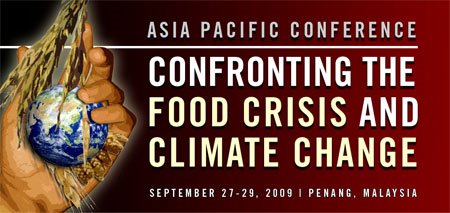Climate Change and its Impact on Food and Agriculture by Lim Li Ching of Third World Network, Malaysia
We know that climate change is very real and that we are feeling the impacts around the world. Even very small changes have very catastrophic effects on sea level, weather events, and food and agriculture production. It is a completely unjust situation. The US is the biggest polluter and emits about 30 per cent. Climate refugees are going to be a huge problem, mainly in Asia. Also, it is important to remember that IPCC estimates are conservative estimates because these are consensus documents. Latest estimates of FAO is 900 million people being pushed into poverty.
Model of industrial agriculture dominates and has contributed to climate change itself. Can we really rethink agriculture? Can we achieve a paradigm shift? Sarath Fernando earlier pointed this out in his keynote address on small farmers in Sri Lanka. Business as usual is no longer an option; we need to radically overhaul agriculture. The future of agriculture lies in biodiverse, ecologically-based agriculture. We can not rely on industrial agriculture, especially in the context of the economic crisis, food crisis and climate change. The voice of small farmers needs to be heard. The IAASTD report substantiates this. Ecological agriculture rooted in farmers’ knowledge can respond well to changes in climate.
Developing countries need a fair deal at global conferences such as COP 15. The Campaign ‘repay the climate debt’ calling on developed countries to repay developing countries is now an ongoing signature campaign.
Responsible and Ethical Consumption by Dr. Vokyung Song of Consumers Korea
We work with concern for others and take into account the interests of others. We work through linkages between ourselves and with others, and through communication. If we created the problems, how can we create the solutions? Who will support the solutions and create a support system? My suggestion is to link with others and multiply this effect.
Ethical means what is wrong and what is right? Responsible behaviour means taking into account the interests of others. We can achieve this through positive buying and negative purchasing.
Food Crisis, Globalisation and Financial Crisis by Antonio Tujan Jr. of Asia Pacific Research Network, Philippines
The past 5 years have given multiple crises – subprime, bailouts, endangerment of ‘real’ economy. Recession can no longer be simply called a recession, but intensification of cyclical forms of recession. Other forms of crisis showed the complexity: energy crisis; limited fossil fuel production; but also speculation; war; manipulation of futures markets; search for new markets; price spikes and; finance of new speculative investment in exploration and extraction - new oil found, searching for more expensive oil, exploration, exploitation.
Food crisis followed and is similar. It is an artificial shortage with new liberal reforms adversely affecting the countries of third world and impacting the global market. Increased sensitivity; speculation and; agrofuels taken together are fundamentally linked to imperialist globalisation. Globalisation is about crisis, and it produces more crises. Overproduction necessitates neoliberalisation, fake markets of finance, using technology of past decades to expand production and reduce costs, transportation, new markets, distortion of markets for energy and for food products. Cyclical markets and prices are just new forms of capitalist crisis. This financial crash is the extension of the crisis we have seen since the 1990s. The impact and result of neoliberalism is the loss of food self sufficiency and security, and food sovereignty. Restructuring of agriculture increases the role of agri-business, that are anti-nature and that control the supply chain with market-domination over production.
The upcoming food summit in Rome is meant to address this topic. Sadly, the conflict is the fight between the status quo (led by the FAO) and balancing of interests against a new offensive, an aggressive push by TNCs to resurrect the green revolution in Africa. This is being pushed and we need to respond with alternatives. The Gates Foundation, OECD funders and AGRA will win in their effort to corporatise agriculture in Africa if we do not push back with alternatives.
The food summit in Rome will be an important struggle to push forward food sovereignty. Add to this, climate change. Is it just a fact of life? Yes, but it is not just. We need to understand the issue beyond injustice and see the fundamental roots of climate change. Not simply capitalism, but in monopoly capitalism. This was pushed to excess and to unsustainable proportions because of capitalist accumulation and greed. Exhaustion of raw materials, colonialism, producing more than what is needed in order to maximize profits are also in place. This is the ecological aspect of imperialism. This is the root of climate injustice. We are beyond the industrial revolution and have gone to the molecular level. The question of creating synthetic replacements of nature is happening now.
Climate change is a wake up call against capitalism and imperialism. It is not just about adaptation or mitigation. What we need is a lifestyle and economy change. A people’s protocol is needed that calls for a social revolution against the imbalance in society.
Sunday, September 27, 2009
Subscribe to:
Post Comments (Atom)


No comments:
Post a Comment